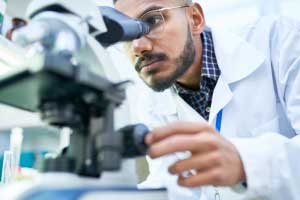Disclaimer: The information on our website is provided for general information purposes only. We make no representations or warranties of any kind, express or implied, about the completeness, accuracy, reliability, suitability or availability with respect to the website or the information contained on our website for any purpose. Any reliance on such information is therefore strictly at your own risk and we are not liable for any damages or losses arising out of or resulting from your reliance on any information contained on our website.
A cytotechnologist specializes in the study of cells. They are trained to look for abnormalities that may indicate disease or infection. Cytotechnologists work in labs; they stain, mount, and study cells through a microscope. These technologists are instrumental in helping detect cancer and other cell abnormalities. Additional career titles include cytology lab manager or technical specialist. Watch the following video from a cytotechnology student.
How to Become a Cytotechnologist

According to O*NET OnLine, almost 40% of the cytotechnologists surveyed held a bachelor’s degree. A little over 60% continued their education or sought additional certifications. Degrees sought are cytotechnology, biology, or other life sciences, including strong foundations in sciences and math. Classes such as biology, chemistry, and math are standard. Hands-on coursework is usually required as well. These expereiences teach and emphasize laboratory skills. It includes safety procedures and lab management.
When seeking a program to become a cytotechnologist, you’ll want to find degree programs accredited by the National Accrediting Agency for Clinical Laboratory Sciences (link opens in a new tab). Checking this will ensure your chosen programs credentials and that they meet common industry standards.
Although not always required, some states prefer or mandate licensure to work as a cytotechnologist. We encourage you to research your state’s licensure requirements. You can find this through the department of health or boards of occupational licensing. If required, you will need to sit for an examination. In addition to earning a degree and certification, you should also be independent, meticulous, enjoy microscopic work, and have a high degree of responsibility and independence in your workflow.
Job Description of a Cytotechnologist
Cytotechnologists study and analyze cells for abnormalities, including differences in cell color, shape, and size. The findings can detect cancer, viral/bacterial infections, or other abnormal conditions. If an abnormality is detected, cell samples are given to a pathologist. A pathologist is a medical doctor who specializes in body tissue. These professionals help diagnose a patient’s medical condition accurately, to determine the most appropriate and effective treatment plan.
Along with lab work, cytotechnologists must document their findings appropriately. Attention to detail is critical in this profession as they are looking for any sign of abnormality under a microscope. However, it is also crucial for accurate documenting of their reports and findings as well. They also must ensure that lab and equipment are sterile and follow laboratory procedures for specimen storage, preparation, and safety of cell sample collections.
According to the Bureau of Labor Statistics, over 50% of cytotechnologists work in hospitals, whereas 20% work at private labs and 6% at medical universities. Most cytotechnologists work full time and 8 hours a day. They often work alone in a sterile environment and spend most of their time sitting at a microscope. Cytotechnologists must follow safety protocols, and pending on what they are evaluating may have to wear protective gear. Gear includes items such as masks, gloves, and goggles. It can also be stressful due to the demand for fast and accurate work at more extensive medical facilities, therefore one must work well under pressure.
Benefits of a Cytotechnologist
Now, let’s learn about the benefits of working as a cryotechnologist. First, cytotechnologists have the opportunity to save lives through their diligent research. Their expertise allows for life-saving diagnoses and facilitates early disease treatment. Additionally, they get to work independently and collaboratively with other healthcare professionals. Finally, with an ever-growing demand for experienced practitioners, they enjoy career stability across various geographical locations.
Career Article Resources
National Center for O*NET Development. 29-2011.02. O*NET OnLine.
T. Dillon. Summer 2008. Occupational Outlook Quarterly. Healthcare jobs you might not know about.
